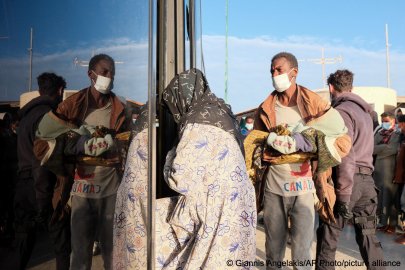More deaths at sea following EU-Turkey migrant deal, finds study
Source: InfoMigrants: reliable and verified news for migrants – InfoMigrants
Research carried out by the IMT School for Advanced Studies in Lucca has found that a deal on migrants between Turkey and the EU, forged in 2016, contributed to move migration journeys towards more dangerous routes, increasing the number of deaths reported in the central Mediterranean Sea.
A 2016 deal between the European Union and Turkey to reduce migration did not end up decreasing the number of irregular arrivals but only moved migrant journeys towards more dangerous routes, increasing the number of deaths reported in the central Mediterranean, according to research published on June 24 in the magazine Humanities and Social Sciences Communications by the IMT School for Advanced Studies Lucca, a research institution and a graduate school in Italy.
Read Also
Do Europe’s restrictive migration policies really work? And at what cost?
Scenario in case of no EU-Turkey deal
The authors of the study, Irene Tafani and Massimo Riccaboni, conducted analysis to understand what would have happened in the absence of a deal between the EU and Turkey. In particular, they tried to evaluate how many migrants would have crossed the border between Turkey and Greece and how many would instead have chosen alternative routes, based on monthly data provided by the EU border agency Frontex and on the number of victims documented by the Missing Migrants Project managed by the International Organization for Migration (IOM).
The results showed that, between April and December 2016, some 2,000 migrants who would have crossed the eastern Mediterranean were instead rerouted towards the central Mediterranean, a deadlier route.
Read Also
New EU regulations: deportations, return hubs, detention, bans and more
‘Bilateral agreements move flows without stopping them’
The mortality rate along the central Mediterranean route has nearly doubled following the agreement. Combining the data on crossings with the mortality rates observed, the study estimated a net increase of some 45 deaths attributed to the impact of the EU-Turkey deal.
“Our work highlights the need for global policies,” explained Tafani, the first author of the study.
“It makes no sense to forge agreements with single countries and focus only on one migration route. Bilateral agreements without wider coordination could simply move migration flows and end up driving vulnerable populations towards even more dangerous routes,” added the researcher.
“Policy makers should resist the temptation of celebrating a decrease in arrivals in Greece without recognizing that these people did not forgo migration. They are simply finding alternative routes, endangering their lives more in Libyan waters,” commented Riccaboni, an economics professor at the IMT School for Advanced Studies Lucca.
The original article: belongs to InfoMigrants: reliable and verified news for migrants – InfoMigrants .



